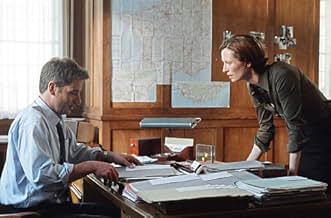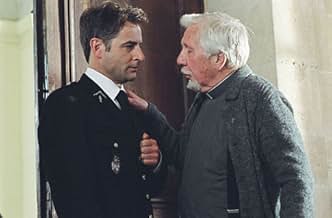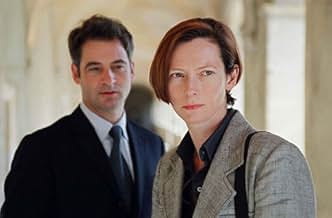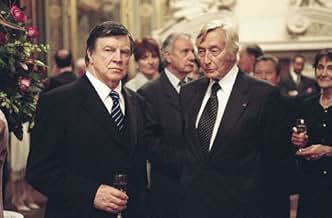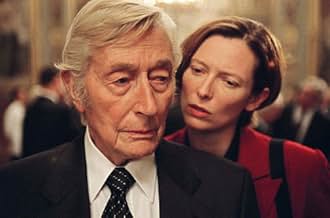CALIFICACIÓN DE IMDb
6.2/10
5.7 k
TU CALIFICACIÓN
Agrega una trama en tu idiomaTale of a former Nazi executioner who becomes a target of hitmen and police investigators.Tale of a former Nazi executioner who becomes a target of hitmen and police investigators.Tale of a former Nazi executioner who becomes a target of hitmen and police investigators.
- Dirección
- Guionistas
- Elenco
- Premios
- 4 premios ganados en total
David de Keyser
- Dom André
- (as David De Keyser)
- Dirección
- Guionistas
- Todo el elenco y el equipo
- Producción, taquilla y más en IMDbPro
Opiniones destacadas
Pierre (Michael Caine) is a Nazi collaborator who has been in hiding for years. He was going to be executed for his deeds but had help escaping decades ago. Now, a judge and colonel are looking for him....as well as some Nazi hunters. But there are two things standing in their way...Pierre is a pretty deadly man and keeps killing Nazi hunters AND Pierre is still getting help from both members of the Catholic church AND government officials. Can they capture the man? And, can the judge and colonel get him to tell them WHO has been helping him?
Although Michael Caine is the star and he's good in the film, he's actually NOT featured all that prominently in the movie. Instead, it shows the various folks coming after him and explaining why...why folks would help a monster like him. Overall, it's a very interesting movie....with a tory that is quite satsifying. One complaint, however, is the lack of French actors in the film...and everyone is supposed to be French. Another is that the film is supposed to be set in the present day (2003) but I think it would have worked better having been set in the 1960s-80s. It's just hard to imagine a man as old a Pierre being such a tough character who's able to kill various Nazi hunters...it just didn't seem realistic as the crimes he committed occurred in 1944...and that would make his character about 80 (more or less) and I cannot imagine any 80 year-old being that dangerous when cornered.
Although Michael Caine is the star and he's good in the film, he's actually NOT featured all that prominently in the movie. Instead, it shows the various folks coming after him and explaining why...why folks would help a monster like him. Overall, it's a very interesting movie....with a tory that is quite satsifying. One complaint, however, is the lack of French actors in the film...and everyone is supposed to be French. Another is that the film is supposed to be set in the present day (2003) but I think it would have worked better having been set in the 1960s-80s. It's just hard to imagine a man as old a Pierre being such a tough character who's able to kill various Nazi hunters...it just didn't seem realistic as the crimes he committed occurred in 1944...and that would make his character about 80 (more or less) and I cannot imagine any 80 year-old being that dangerous when cornered.
I rated this film a 7/10 - with some mixed feelings, because in many ways it was a downbeat film without any kind of neat "message" that would make me feel "a better person" for having seen it. But on second thought I realized that the finished film rather neatly reflects the moral complexity of Brian Moore's novel which it is based upon - and which Ronald Harwood's screenplay follows remarkably closely.
Brian Moore is one of my favorite late 20th century authors, whose work has provided the basis for several other memorable films, most notably "Black Robe." He writes in a Graham Greene-esque mode, his characters often anguished or guilty Catholics or ex-Catholics who struggle to live morally in a degraded and corrupt world. Moore himself appears to have known much about divided loyalties and twentieth century alienation. Although identified as a Canadian author, Moore was born in Ulster - and actually lived most of his later life in California and the South of France. He was clearly fascinated by questions of faith, of good and evil - and he boldly tackled these themes in "The Statement."
In France in the late 1980s and early 1990s there were several prominent cases of Vichy-era collaborators who were belatedly brought to justice by the French court system. Moore was clearly fascinated by the way in which leading members of the French governmental and bureaucratic system continued to hide unpleasant truths about their own pasts - and by the role of the Catholic Church in France in providing refuge and assistance to some individuals who had been involved in the persecution and round-up of Jews.
Michael Caine deserves a great deal of credit for taking on the role of a reprehensible character who nonetheless retains his full humanity. There's never any question in the film about his guilt - he clearly took part in the brutal murder of Jews during wartime. (He's also quite mean to dogs.) And yet he is not without a sympathetic side. It's clear that he's manipulative, but it's also easy to see why many intelligent and devout people of faith would be willing to assist him in his attempt to live "underground" hiding from justice. Caine isn't a caricatured film villain - not like Ralph Fiennes in "Schindler's List" or John Malkovich in "Ripley's Game." But in a real sense, it's all the more disturbing that he seems like "just another innocuous old man."
It was disappointing to me to see that fine performers Jeremy Northam and Tilda Swinton with so little to do in the film - other than looking bewildered as Caine's character continues to elude their grasp. On the other hand, it is quite enjoyable to watch their flirtatious glances with one another. There were many nice touches in the film showing the pleasures of French life - gourmet business lunches, for example, and the beautiful scenery of Provence. Even the supposedly seedy cafes look like they belong in a tourist brochure.
Brian Moore is one of my favorite late 20th century authors, whose work has provided the basis for several other memorable films, most notably "Black Robe." He writes in a Graham Greene-esque mode, his characters often anguished or guilty Catholics or ex-Catholics who struggle to live morally in a degraded and corrupt world. Moore himself appears to have known much about divided loyalties and twentieth century alienation. Although identified as a Canadian author, Moore was born in Ulster - and actually lived most of his later life in California and the South of France. He was clearly fascinated by questions of faith, of good and evil - and he boldly tackled these themes in "The Statement."
In France in the late 1980s and early 1990s there were several prominent cases of Vichy-era collaborators who were belatedly brought to justice by the French court system. Moore was clearly fascinated by the way in which leading members of the French governmental and bureaucratic system continued to hide unpleasant truths about their own pasts - and by the role of the Catholic Church in France in providing refuge and assistance to some individuals who had been involved in the persecution and round-up of Jews.
Michael Caine deserves a great deal of credit for taking on the role of a reprehensible character who nonetheless retains his full humanity. There's never any question in the film about his guilt - he clearly took part in the brutal murder of Jews during wartime. (He's also quite mean to dogs.) And yet he is not without a sympathetic side. It's clear that he's manipulative, but it's also easy to see why many intelligent and devout people of faith would be willing to assist him in his attempt to live "underground" hiding from justice. Caine isn't a caricatured film villain - not like Ralph Fiennes in "Schindler's List" or John Malkovich in "Ripley's Game." But in a real sense, it's all the more disturbing that he seems like "just another innocuous old man."
It was disappointing to me to see that fine performers Jeremy Northam and Tilda Swinton with so little to do in the film - other than looking bewildered as Caine's character continues to elude their grasp. On the other hand, it is quite enjoyable to watch their flirtatious glances with one another. There were many nice touches in the film showing the pleasures of French life - gourmet business lunches, for example, and the beautiful scenery of Provence. Even the supposedly seedy cafes look like they belong in a tourist brochure.
I dare say this film would have been much better received had it cast the film logically rather than have 'everybody's favourite Cockney' Michael Caine playing somebody called Pierre Boussard - I mean, Caine has never struck me as a "Pierre" somehow. And we can say for sure, that it couldn't have done any worse, a $22m financial loss is testament to that.
Of course I realise the book is in English, but there is a big difference between the two mediums and very rarely does a film pull off a stunt like this, see 'The Hunt For Red October' or Jude Law's Russian misfortune in 'Enemy At The Gates'. At least The Statement didn't slip into having Caine and co. adopt Gallic accents - that would have been too much to bare.
As for the film itself, it seemed a complete waste of police time to have half of the French PD chasing round after an OAP with a heart condition who'd been *ordered* to kill seven people 50 years earlier during German occupation. And for the film to set itself up as some sort of chase thriller, it very rarely gets past a stroll and the tension never really reaches the levels it should do.
All that said though, there are far worse films out there and this isn't an altogether bad way to spend 2 hours. 6/10
Of course I realise the book is in English, but there is a big difference between the two mediums and very rarely does a film pull off a stunt like this, see 'The Hunt For Red October' or Jude Law's Russian misfortune in 'Enemy At The Gates'. At least The Statement didn't slip into having Caine and co. adopt Gallic accents - that would have been too much to bare.
As for the film itself, it seemed a complete waste of police time to have half of the French PD chasing round after an OAP with a heart condition who'd been *ordered* to kill seven people 50 years earlier during German occupation. And for the film to set itself up as some sort of chase thriller, it very rarely gets past a stroll and the tension never really reaches the levels it should do.
All that said though, there are far worse films out there and this isn't an altogether bad way to spend 2 hours. 6/10
"The Statement" deserves far better ratings than critics have given it. In the first place, it's NOT about an ex-Nazi in flight. It's about a French collaborator, the Vichy Government, France's failure to confront the role its officials -- some still in power -- played in the Holocaust, and the efforts of right wingers in the Catholic Church to shelter the collaborator. Michael Caine is superb in the leading role, and Tilda Swinton and Jeremy Northam are excellent as the judge and army colonel who are trying to bring him to justice while those who formerly hid him seek to execute him, blaming a non-existent group of Jewish vigilantes. The supporting cast, which includes the wonderful Charlotte Rampling in a minor role as the collaborator's undivorced wife, is also quite good. I don't see how anyone can complain that this movie "drags." While there are legitimate criticisms that could be made about unexplained motives, the action moves at the appropriate pace given the complexity of the story it is telling.
After the Nazi's were driven out of France, those who had collaborated were mostly rounded up and punished many by death. However some escaped and were hidden, while others rose in power within the new regime. Pierre Brossard is one of the former and continues to live in fear, protected from those that would avenge his victims by his friends within the Catholic Church. However a close encounter shows that some group is closing in on him, meanwhile political pressure from Judge Livi and Colonel Roux's investigation into his whereabouts mean that he is quickly running out of friends willing to shelter him.
It is difficult to know how to approach this film because it itself doesn't seem too sure of what it is trying to do. Is it a drama looking at the idea of fleeing war criminals? Is it a chase movie? Is it a character piece looking at Brossard? It is never clear because it does do some elements of each but it doesn't really do anything that well and I, as a viewer, was a bit confused about what I was supposed to feel or think during it. The story itself is OK, reasonably engaging but not having anything of interest to it. As a chase film I was interested and the themes helped it seem more than the sum of its parts but not in reality. The motivations of the characters are never that well developed; the Livi/Roux parts are dull and quite routine although the sections with Brossard are more interesting.
It is a shame then that the film cannot decide what it wants to do with him do we feel for him, hate him or just watch him? The film doesn't let us decide this in a good way representing the complex nature of the character, but rather just doesn't push out any ideas one way or another. Caine does well despite this and gives a good character a bit of depth. He is where the film is although he probably benefits from the fact that everyone else is quite ordinary. Swinton and Northam are quite ordinary and their parts of the film just seem put of place and half-cooked. Support from Neville, Bates, Rampling and others just about do the job but add little.
Overall this is an OK film but nothing at all more than that. Despite the interesting and complex potential the film just delivers an ordinary chase movie and fails to do anything with the ideas and concepts inherent in it. Caine does well to produce quite a convincing character but he is alone in that, with the material and the rest of the cast failing to do anything that interesting. Not bad but not worth trying to find because it is nowhere near as good as one would have hoped.
It is difficult to know how to approach this film because it itself doesn't seem too sure of what it is trying to do. Is it a drama looking at the idea of fleeing war criminals? Is it a chase movie? Is it a character piece looking at Brossard? It is never clear because it does do some elements of each but it doesn't really do anything that well and I, as a viewer, was a bit confused about what I was supposed to feel or think during it. The story itself is OK, reasonably engaging but not having anything of interest to it. As a chase film I was interested and the themes helped it seem more than the sum of its parts but not in reality. The motivations of the characters are never that well developed; the Livi/Roux parts are dull and quite routine although the sections with Brossard are more interesting.
It is a shame then that the film cannot decide what it wants to do with him do we feel for him, hate him or just watch him? The film doesn't let us decide this in a good way representing the complex nature of the character, but rather just doesn't push out any ideas one way or another. Caine does well despite this and gives a good character a bit of depth. He is where the film is although he probably benefits from the fact that everyone else is quite ordinary. Swinton and Northam are quite ordinary and their parts of the film just seem put of place and half-cooked. Support from Neville, Bates, Rampling and others just about do the job but add little.
Overall this is an OK film but nothing at all more than that. Despite the interesting and complex potential the film just delivers an ordinary chase movie and fails to do anything with the ideas and concepts inherent in it. Caine does well to produce quite a convincing character but he is alone in that, with the material and the rest of the cast failing to do anything that interesting. Not bad but not worth trying to find because it is nowhere near as good as one would have hoped.
¿Sabías que…?
- TriviaAs of April 2019, this is producer and director Norman Jewison's last movie.
- ErroresWhen Brossard searches the killer's wallet, we can see 500 francs banknotes with the head of Pierre and Marie Curie. This kind of banknote was released in 1994 and the action takes place in April 1992.
- Citas
Pierre Brossard: Pray that we meet again... in this world.
- ConexionesFeatures Sólo tú (1994)
- Bandas sonorasLe Chemin des Forains
Music by Henri Sauguet
Lyrics by Jean Dréjac
Performed by Baguette Quartette
Published by G. Schirmer Inc., administered by Music Sales Corporation
Courtesy of Baguette Quartette
Selecciones populares
Inicia sesión para calificar y agrega a la lista de videos para obtener recomendaciones personalizadas
- How long is The Statement?Con tecnología de Alexa
Detalles
- Fecha de lanzamiento
- Países de origen
- Sitio oficial
- Idiomas
- También se conoce como
- The Statement
- Locaciones de filmación
- Productoras
- Ver más créditos de la compañía en IMDbPro
Taquilla
- Presupuesto
- USD 27,000,000 (estimado)
- Total en EE. UU. y Canadá
- USD 765,637
- Fin de semana de estreno en EE. UU. y Canadá
- USD 37,220
- 14 dic 2003
- Total a nivel mundial
- USD 1,079,822
- Tiempo de ejecución
- 1h 54min(114 min)
- Color
- Mezcla de sonido
- Relación de aspecto
- 1.85 : 1
Contribuir a esta página
Sugiere una edición o agrega el contenido que falta



